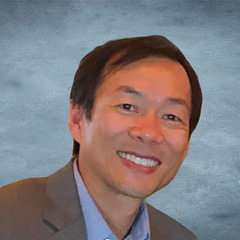Campus News
$4 million NSF grant will fund project to improve K-12 mathematics education in partnership with Black disabled students
A grant from the National Science Foundation’s Racial Equity In STEM Education program will support a project led by Assistant Professor of Education Paulo Tan to develop new professional learning resources for K-12 math teachers through a partnership with Black disabled students.

Person removing formulas from the blackboard

A more than $4 million grant from the National Science Foundation’s Racial Equity In STEM Education program will support a project to develop new professional learning resources for K-12 math teachers through a four-year partnership between education researchers and Black disabled students.
The project, led by UC Santa Cruz Assistant Professor of Education Paulo Tan, positions students as co-researchers and advisors who can help to identify dysfunctional educational practices and offer alternatives. In particular, the team will aim to dismantle systemic racism and ableism within mathematics instruction practices, in order to help all students realize their full potential, both as learners and change leaders within the education system.
“Math is one of those content areas that people tend to think is totally objective, but it’s actually very political and biased in terms of how we’ve defined what counts as doing math or thinking mathematically.” Tan explained. “We are all math thinkers and doers, but we have been made to believe that only certain people are good at math, and that’s a big problem. Math then acts as a gatekeeper and keeps people out of all kinds of learning opportunities, from grade school all the way through college.”
For example, students may continually be held back in remedial classes because of the assumption that they can’t grasp mathematical concepts, when in fact, they may be actively resisting curriculum that they don’t find relevant. Students with intersecting identities are particularly likely to experience a watered-down mathematics curriculum.
“The separating out of students into different levels of math classes in K-12 settings is a form of ableism, and those groups also tend to be drawn across racial lines,” Tan said. “These are segregated spaces where students who are considered to have ‘lower ability’ miss out on opportunities to engage in more different types of mathematics, and students on the ‘high ability’ track miss opportunities to engage with the more diverse mathematical thought of their peers on other tracks.”
The new project will work to remedy these issues by developing a new model for mathematics instructional coaches to use that will help support teachers in better serving students with diverse backgrounds and experiences. Mathematics coaches are typically school district employees who provide professional support to teachers in order to improve math instruction. These coaches are well positioned to create systemic change in classrooms, but the profession has traditionally not prioritized intersectional and justice-oriented work.
Tan and his team aim to change that. Over the next four years, they anticipate working with a cohort of four to six Black disabled students in Oakland public high schools to build and test a new mathematics coaching framework that applies principles of intersectional justice to counter racism and ableism. The group of student co-researchers will be diverse in terms of gender, mathematics “ability,” and disability category, including whether they receive special education services in general education mathematics settings or separate segregated classrooms.
Development and initial piloting of the new coaching model will take place in Oakland, California, followed by a full study in Charlottesville, Virginia, and Raleigh, North Carolina, to strengthen and test the coaching model’s transferability. University of Virginia Associate Professor Jonee Wilson and North Carolina State University Professor Jessica Hunt will help to lead the project, alongside Tan and the students.
Tan believes the results of the project will demonstrate the strengths and capabilities of Black disabled students, not only for mathematics learning, but also for leading social change.
“In mathematics education, we typically center ‘average’ students, but this project asks ‘what would happen if we center our most marginalized students instead?’” he said. “Their ideas and perspective and knowledge can inform better math coaching with the potential to transform math education and society.”